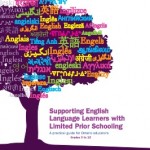Below are the ESL/ELL policy documents, guidelines, and reports published by the Government of Ontario. These documents ought to be consulted by teachers with ELL students.
 Capacity Building Series Special Issue #8: ELL Voices in the Classroom
Capacity Building Series Special Issue #8: ELL Voices in the Classroom
(Literacy and Numeracy Secretariat, 2009)
The Capacity Building Series was produced by the Literacy and Numeracy Secretariat to support leadership and instructional effectiveness in Ontario Schools.
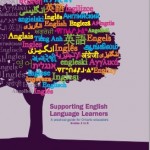 Supporting English Language Learners: A Practical Guide for Ontario Educators, Grades 1 to 8
Supporting English Language Learners: A Practical Guide for Ontario Educators, Grades 1 to 8
(Ontario Ministry of Education, 2008)
This guide is designed to support teachers, principals, and other education professionals in elementary schools to work effectively with English language learners. This resource guide provides a rich source of practical techniques, research findings, and strategies that can be put to immediate use in the classroom and in the school.
(Ontario Ministry of Education, 2008)
This guide presents the array of challenges to and opportunities for educators in Ontario schools. It attempts to demystify some of these challenges, and highlight strategies that educators may use to create possibilities and opportunities for English language learners with limited prior schooling.
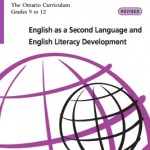 The Ontario Curriculum, Grades 9-12: English As a Second Language and English Literacy Development
The Ontario Curriculum, Grades 9-12: English As a Second Language and English Literacy Development
(Ontario Ministry of Education, 2007)
This ministry document outlines the expectations for all Grade 9 to 12 English as a Second Language (ESL) and English Literacy Development (ELD) courses.
Since September 2007, all courses in ESL and ELD have been based on the expectations outlined in this document
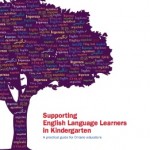 Supporting English Language Learners in Kindergarten: A practical guide for Ontario educators
Supporting English Language Learners in Kindergarten: A practical guide for Ontario educators
(Ontario Ministry of Education, 2007)
This is a resource and tool for teachers, administrators, and other school staff as they support ELLs in achieving the overall expectations of the Kindergarten program. This resource provides a rich source of research findings, practices, and strategies that can be put to immediate use in the school and the classroom. You will also find valuable information on working with families and communities, working with the ELLs in your Kindergarten classrooms, and working as a whole school to provide a quality beginning school experience for ELLs.
 Lessons from EQAO Data on English Language Learners in Ontario Schools
Lessons from EQAO Data on English Language Learners in Ontario Schools
(Literacy and Numeracy Secretariat, 2007 )
Author: E. Coelho
This article analyzes EQAO data in order to determine how long it takes for ELLs to catch up to their age peers on literacy assessments in English. The article concludes with a 10-point action plan for accelerated language acquisition, with a focus on underperforming groups.
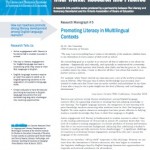 Research Monograph #5: Promoting Literacy in Multilingual Contexts
Research Monograph #5: Promoting Literacy in Multilingual Contexts
(Literacy and Numeracy Secretariat, 2007)
Author: J. Cummins
This article shows how teachers can promote strong literacy development among English language learners (ELL) by supporting students in relating their pre-existing knowledge to new learn.

